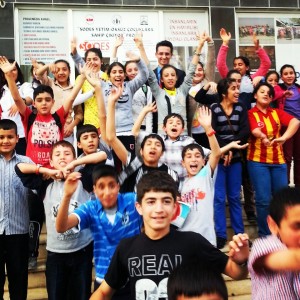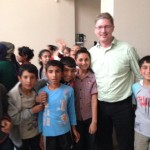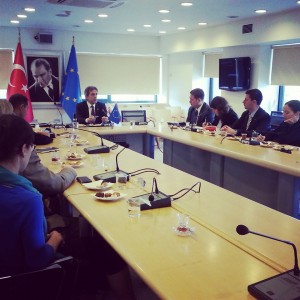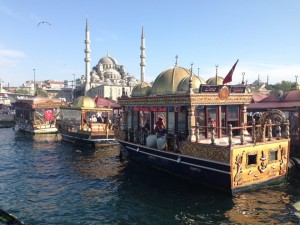
ABDULLAH BOZKURT
SEE ALSO: Gulen in the Western media
One of the main reasons why Islamic scholar Fethullah Gülen has been so disturbed by the massive graft scandal that was exposed during then-Prime Minister and now President Recep Tayyip Erdoğan's regime is that he saw that his lifetime ideal of fostering greater connectivity among key areas of the country such as education, business and culture in order to contribute to the social, human and economic development of his nation had been severely undermined.
Born into a poor family in one of the less developed parts of Turkey, Gülen has long dreamt of seeing the impoverished eastern and southern regions of the country developed with trade, investment and improvement in educational and technological infrastructure. This has been dealt a huge blow because of endemic corruption, misuse of funds and patronage that has left millions in poverty; harmed the trust between citizens and the government; and in turn led to political instability, inefficient public services and even a surge in terrorism. The big dragnet set up by the crooks has drained the precious energy Turkey has in order to cope with immediate challenges. It has hampered the efforts of Gülen, who, through his numerous writings and speeches, inculcated the importance of modern education for the young generation and urged his followers to reach out and embrace all through intercultural and interfaith dialogue activities.
When Erdoğan deliberately relegated his understanding of democracy to merely winning the ballot box during elections, he made it clear that he wants neither political accountability for things that may go wrong during his rule nor the participation of civil society as a major stakeholder in the governance of the country. When he calls the Gülen-inspired social movement called Hizmet a "parallel structure," Erdoğan in effect complains about "institutional restraints” being placed on the government by a major civil society group that would otherwise be welcomed and encouraged in any normally functioning democracy.
Capitalizing on the new-found scapegoat right after the corruption exposé, Erdoğan broadened the definition of "enemy of the state" to include judges, police investigators, businesses, media, national political parties and even Turkey's foreign allies and partners.
That is why the corruption in the Erdoğan regime has now resulted in the flagrant human rights violations that we all are witnessing and experiencing in today's Turkey. The policies employed by Erdoğan and company in the government have effectively disrupted citizens' lives by provoking fears of a witch hunt among the population. The growing concern about media freedom in Turkey is just one of the indications of how corruption has shaken fundamental freedoms. If that cancer spreads to the judiciary as Prime Minister Ahmet Davutoğlu's government tried to do with offerings such as a pay rise and government perks on the eve of critical judicial council elections, this will have a very serious impact on the judicial system, which may very well paralyze the whole Turkish democracy in the end.
In addition to the voluntary education drive that focuses on science and mathematics as well as moral values in order to lift people out of poverty, another tool Mr. Gülen has been advocating throughout his life is to institute open trade among nations as a way to not only develop economies, but also to increase interaction among them. Gülen believes that one can build to promote intercultural and interfaith dialogue in a much freer and effective way if trade, investment and business linkages are strong. Inspired by Gülen's teachings, thousands of Turkish businesspeople came together and set up the Turkish Confederation of Businessmen and Industrialists (TUSKON), the largest and one of the most influential trade advocacy groups in Turkey.
Since corruption destroys the level playing field by raising barriers for both national and foreign companies and undermines the development of a fair and competitive market economy, law-abiding businesspeople like TUSKON members will be at a disadvantage against pro-Erdoğan businesses, which enjoy advantages in terms of obtaining public procurement contracts and receiving preferential access to public services in exchange for the payment of kickbacks and bribery.
Adding insult to injury, TUSKON as well as members of the Turkish Industrialists and Businessmen's Association (TÜSİAD), the wealthiest business club in Turkey, have been unfairly targeted with government audits and reviews of licenses and permits and subjected to heavy fines. On top of that, Gülen's interaction with leading TUSKON and TÜSİAD members as part of his ideal to use trade as an intercultural bridge has been publicly demonized by Erdoğan, who sticks to a long-running hateful discourse to divide the nation.
Therefore, Gülen believes both education and trade will contribute greatly to economic growth both in Turkey and in its partner countries, providing more equitable income distribution, improved government services and increased public trust in government. Considering that the corruption negatively affects education, it does have a domino impact on every aspect of citizens' lives, from access to the labor market to improved social and economic status.
Moreover, Gülen underlines that education is key for social cohesion in Turkish society, preventing people from falling into traps of radical ideologies on the extreme left and extreme right. He thinks the right education rather than political Islamist discourse will maintain the strong culture of tolerance and diversity found in Turkish history. In the end, Gülen thinks Islam's true and peaceful face can only prevail in stable and conflict-free environments that are no longer plagued by corruption.
Another important rule in Gülen's teachings is the focus on decentralization, which is also an important tool in the battle against corruption. It is acknowledged that decentralization has often proven to be instrumental in reducing corruption in government, especially in a large country like Turkey with a population of 77 million.
Provided that the capacity for governance, effectiveness, human resources and accountability are strong in local governments, decentralization is often a suggested method to improve the governance of the country with less graft activity. It is quite telling that the corruption scandal revealed the reasons why Erdoğan usurped so many powers of local government in leasing and selling public land and buildings starting in 2011. That is how Erdoğan's loyalists have started getting kickbacks from the sale of public properties that used to be managed by local officials.
As part of the decentralization, Gülen often talks at length urging his followers to go through an in-depth consultation process and reaching out to all stakeholders before starting to implement a policy decision. He says this is the way of the Islamic Prophet. In fact, Gülen himself leads by setting an example on decentralization. For example, Hizmet and Hizmet-affiliated institutions may have been inspired by Gülen, but none of them are governed by Gülen or his close advisers. They are all professionally managed with their own independent boards that are accountable to shareholders. They are completely transparent in terms of subjecting themselves to rigorous government laws, regulations and regular reviews. From banking to media outlets, from social charity groups to thousands of schools, none of them has had any interference by Gülen. If these institutions are outside of Turkey, the same principle follows. They have to respect the law of the land in any given country.
Unfortunately, by invoking the fallacy of "guilt by association," Erdoğan has declared a total war on all these companies, institutions and groups that may be considered to be sympathetic towards Gülen, who suddenly turned out to be the number-one enemy of Erdoğan because of his criticism about corruption and mismanagement. This misplaced battle has in the first place damaged Turkish economic and social structures, but Erdoğan does not seem to care about that at all because his priority is to survive personal legal troubles emanating from the corruption that incriminated him, his family members and close associates.
Erdoğan erroneously believes that as long as he keeps demonizing Hizmet and shifting the blame for his personal problems on members of Hizmet, he will be able to survive politically forever.
No doubt Gülen, a deeply religious person, is also troubled by the moral and religious implications of corruption as well. As a leading Islamic scholar, he witnessed how political Islamists have abused entrusted power by citizens of Turkey and exploited religious sensitivities of people for personal gains. This hurts the religion of Islam first and foremost, Gülen believes. The failed political Islamist experiment in Turkey has also spoiled the national education systen with ill-advised engineering from Erdoğan, who wants to raise a new breed of political Islamists to fuel his political campaigns. Gülen is considerably upset because education, the only way to transition Turkey into the broader world, has been squandered for petty politics and personal interests.
Therefore, fighting corruption and standing firm against intimidation and scaremongering tactics by Erdoğan is also a moral imperative for Mr. Gülen before anything else.
SOURCE: http://www.todayszaman.com/columnists/columnist/abdullah-bozkurt/why-gulen-is-indignant-about-corruption_360189.html
OTHER RECENT ARTICLES:
Foreign Affairs magazine published an important article by Victor Gaetan on Fethullah Gulen and the Gulen Movement. Below is an exerpt and link to...
Radio show host Rita Cosby discusses Fethullah Gulen's strong position against terrorism with Alp Aslandogan. Gulen was the first scholar in the...
It's imperative for those with an interest in today's Turkey to read the recent report prepared by the Washington. DC based Rethink Institute . In...
FBI Washington Field Office Citizens Academy Alumni Association held its annual general meeting at Rumi Forum on September 16,...






